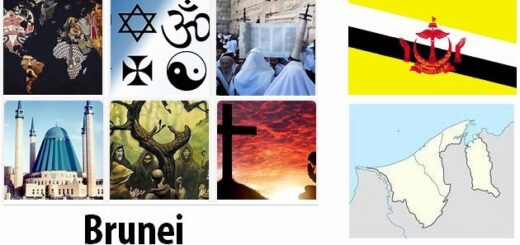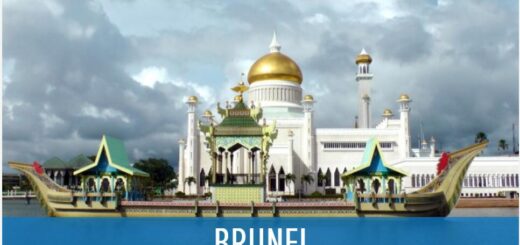Politics and Economy of Brunei
State structure and political system of Brunei
Brunei is an absolute monarchy. Sultan and head of state since 1967 is Hassanal Bolkiah Muizzaddin Waddaulah, the spiritual leader of the Muslims of Brunei. He holds the posts of Prime Minister, Commander-in-Chief of the Armed Forces and Minister of Defense, Minister of Finance. There is no constitution. The highest bearer of executive and legislative power is the Sultan.
Administrative division – four municipalities: B. / Muara, Tutong, Belait, Temburong. The largest city is Bandar Seri Begawan. Check equzhou for political system of Brunei.
One political party has been registered, the Brunei National United Party (BNOP), founded in 1986. It does not play a significant role in the political life of the country. The activities of two opposition parties – the People’s Party and the National Democratic Party – are prohibited.
The leading organization of business circles is the Chamber of Commerce and Industry.
In domestic politics, the concept of the “Malay Islamic Monarchy” operates, which defines Brunei as a state based on the values of the Malay civilization, the laws of Islam and the monarchical system of power. There is a law on internal security that allows the authorities to detain suspects without trial and investigation for an indefinite period.
The foreign policy course is determined by the principles of non-interference in the internal affairs of other countries, respect for territorial integrity and independence, maintenance and strengthening of global peace, security and stability in Southeast Asia on the basis of documents approved by ASEAN.
The royal armed forces number more than 4 thousand people, incl. two infantry battalions, a Navy unit and an Air Force squadron. There is also a battalion of Gurkhas (about 1000 people). The protection of the palaces of the Sultan’s family and government institutions is carried out by a special unit formed from Gurkha reservists. Service in the Armed Forces is voluntary.
Brunei has diplomatic relations with the Russian Federation (established with the USSR on October 1, 1991, confirmed for Russia in April 1992).
Economy of Brunei
Brunei is classified as a developing country. GDP approx. US$ 5 billion, GDP per capita approx. 20 thousand dollars. There are no problems of employment and unemployment, Brunei is an importer of labor. The government is taking steps to recruit a growing number of local expatriates into the public sector. Inflation is in the range of 1-1.2% annually.
The basis of the economy is oil and gas production. Revenues from the industry provide approx. 75% of budget revenues. Oil is produced approx. 180 thousand barrels per day, natural gas more than 12 billion m3 per year. The lion’s share of oil production comes from Brunei Shell Petroleum (BSP), a joint venture between the Brunei government and multinational Royal Dutch Shell. Natural gas production and processing is carried out by Brunei LNG, a joint venture between the Brunei government Shell and the Japanese corporation Mitsubishi. Gas is also produced by the French Total FinaElf. Liquefied natural gas (LNG) is almost entirely exported to Japan and South Korea.
Agriculture is poorly developed. 80% of the main food products are imported.
Foreign tourism does not play a significant role in economic life. Nevertheless, Brunei is seeking to intensify the influx of tourists through the Visit Brunei program. In 2001, its implementation was disrupted due to terrorist attacks in the United States. In 2002, there was a certain increase in the arrival of tourists from ASEAN countries. But in general, this sector is subject to cyclical fluctuations associated with the conditions of the global and regional economy.
The financial and economic policy is focused on stimulating the private sector, attracting foreign investment, and creating a service infrastructure. Brunei International Financial Center, founded in ser. 2000, established preferential conditions for foreign banks and funds opening their branches in the country. The creation of the Center was a response to the globalization of financial and commercial services, it aims to form a joint International Islamic Money Market (IMRM) with Bahrain, Indonesia, Malaysia and Saudi Arabia. In con. 2001 Brunei provided a domestic loan to finance the development of the non-oil sector and meet defense needs.
There are two national banks, 7 foreign banks, as well as a number of financial companies. The main part of the investment is carried out through the state Investment Agency of Brunei, whose task is to control the use of gold and foreign exchange reserves. There is no external public debt.
There is a railway linking Bandar Seri Begawan with the town of Bedas. There is a network of paved roads. There is a modern international airport.
The population is not subject to income tax. Education and healthcare are free.
Foreign trade turnover (1999, billion US dollars): 5.1, incl. export 2.6, import 2.5. The main export items are oil and gas, imports are machinery and equipment, consumer goods, food. The main trading partners are Japan, the Republic of Korea, the USA, Taiwan, and the ASEAN countries.
Science and culture of Brunei
Higher education is aimed at training personnel abroad: in Malaysia, English-speaking countries.
The cultural attractions of the capital are several mosques built in the style of modern architecture, the building of the national library. There are the Historical Museum, the Museum of the Sultan’s Regalia. Cultural life is regulated by Sharia law.


